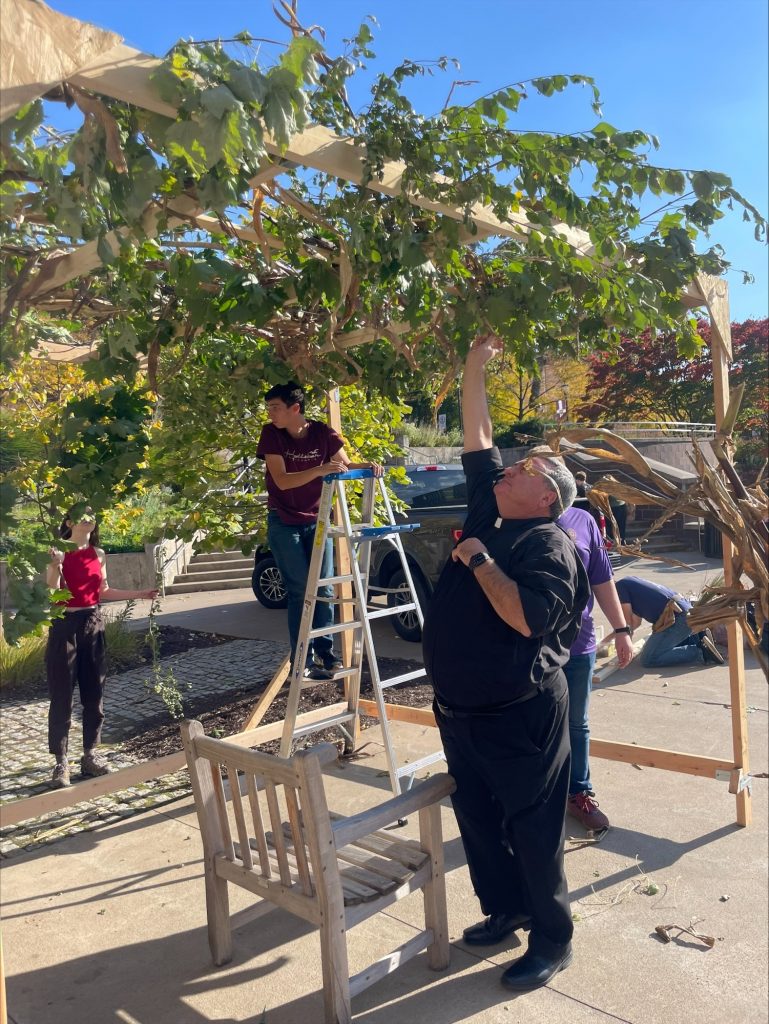The U Celebrates Jewish Holiday

By Kyra Krzywicki – Staff Writer
You might have noticed a large tent-like structure in front of the DeNaples Center between Oct. 11 and 13.
The wooden shelter you saw is known as a Sukkah, a temporary dwelling built to celebrate Sukkot, which is a Jewish holiday celebrated for a period in the fall that is based on the lunar calendar.
Olivia Manarchuck, a junior neuroscience pre-med major, built her Sukkah on campus to pique the curiosity of fellow students and gain a better understanding of her own Jewish roots.
“I grew up in a Christian Jewish home, so I had both kind of cultures right there combined, that fusion of different traditions, so I really thought this was just a unique project to take on,” Manarchuck said.
Manarchuck is currently learning about the Jewish faith and culture in an Honors tutorial, so her mentor, Joe Kraus, Ph.D., invited her to plan this year’s Sukkot celebration all on her own.
“She did all the work. It’s really something,” Kraus said.
Kraus said the eight-day celebration commemorates the 40-year journey after the Jewish Exodus from Egypt but also the harvest time when farmers would build shelters to sleep in for the sake of efficiency.
“It’s simultaneously a celebration of the harvest with the idea that farmers would have to go into their fields, and they wouldn’t be able to come in every night because it would just be too long of a, the Yiddish is ‘schlep,’ too long of a trip back and forth,” Kraus said.
While Manarchuck planned and organized the entire celebration herself, she did have some help with building the structure from her family, who all live close enough to campus to pitch in.
“My dad helped me build this and then I had various other family members help me construct it and design it. They brought tree branches, so it just felt like it was just like a family experience. It was awesome,” she said.
Kraus had similar memories of celebrating Sukkot when he was young.
“Our little, tiny community would come together, and we would build one on the campus where my father taught and we, the four or five Jewish families in town, would meet with the four or five Jewish students and we would build a Sukkah every year, and it was just a really happy memory for me,” Kraus said.
The family member Manarchuck was most excited to share her project with was her grandmother.
“My Savta, which is grandmother in Hebrew, she’s one of the main elements of this because she grew up in Israel and then she came here. So, she has that fusion of cultures, but more so the Jewish part because she was raised as an Orthodox Jew. So just having her be a part of this is really awesome,” Manarchuck said.
Manarchuck said the celebration on campus moved inside because of rain, but students still had the opportunity to eat traditional Jewish foods, pray, and participate in the ushpizin, or the invitation for a guest to join you in the Sukkah.
“I asked other people, ‘Who would you invite?’ It could be anybody. It can be a family member. It can be a professional sports player. It can be a civil rights movement, social justice person, anybody. So that was awesome,” she said.
Nathan Smith, a senior neuroscience major, was excited to attend the event because he helped Manarchuck set up the Sukkah but also because he got to learn about a new culture.
“I enjoyed how intimate the event felt. We had to be inside due to rain, but everyone enjoyed themselves. Everyone was talking and there were Jewish people in the room who were beaming with pride which was amazing to see,” Smith said.
Manarchuck said she hopes that the project helps students expand their interfaith understanding.
“I kind of want to have that fusion of cultures here at the University of Scranton and maybe by the end of when people graduate, they will know about different religions and different holidays that are celebrated with those religions,” Manarchuck said.
If you missed the Sukkot this year or wish to celebrate it again in the future, come back next fall to learn more from Manarchuck herself.
“It’s just a time to get together and hang out and just talk and remember everything God has brought us through. So, I was like, ‘Yes, I’d love to be a part of this project,’ and kind of learning about all the Jewish culture prior to this is kind of what helped me formulate the plan to setting up the Sukkot and all of that so it was a great experience, and I look forward to doing it next year,” Manarchuck said.
